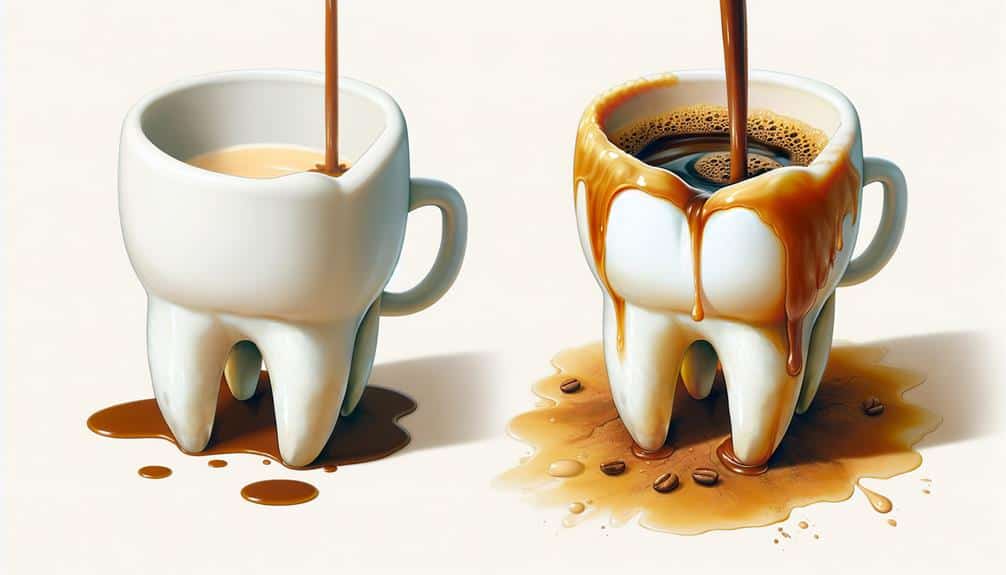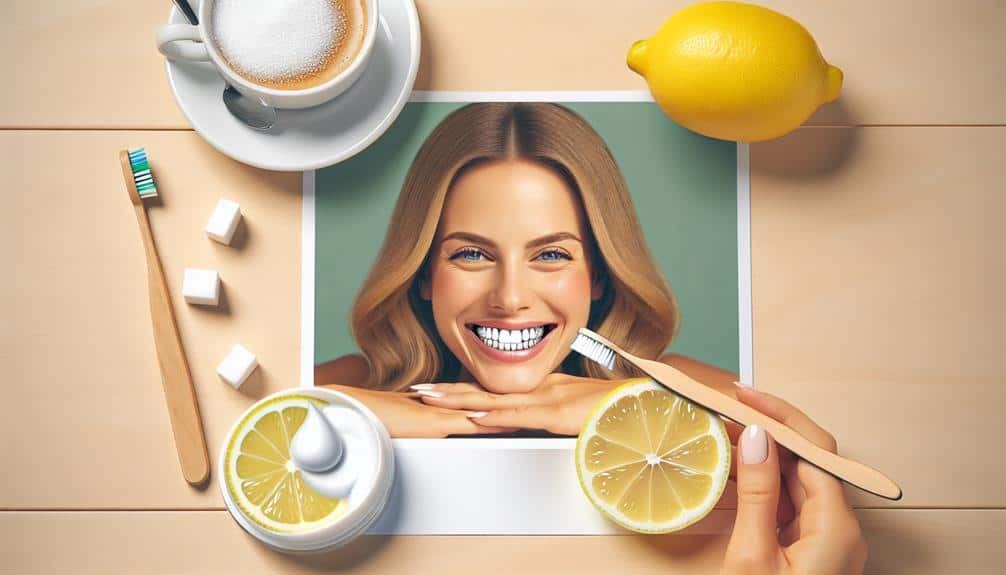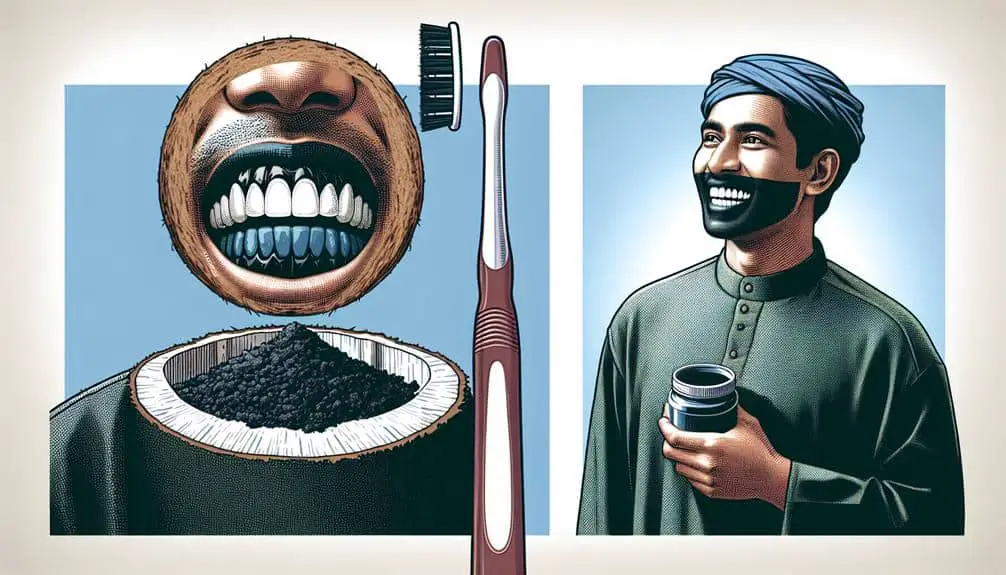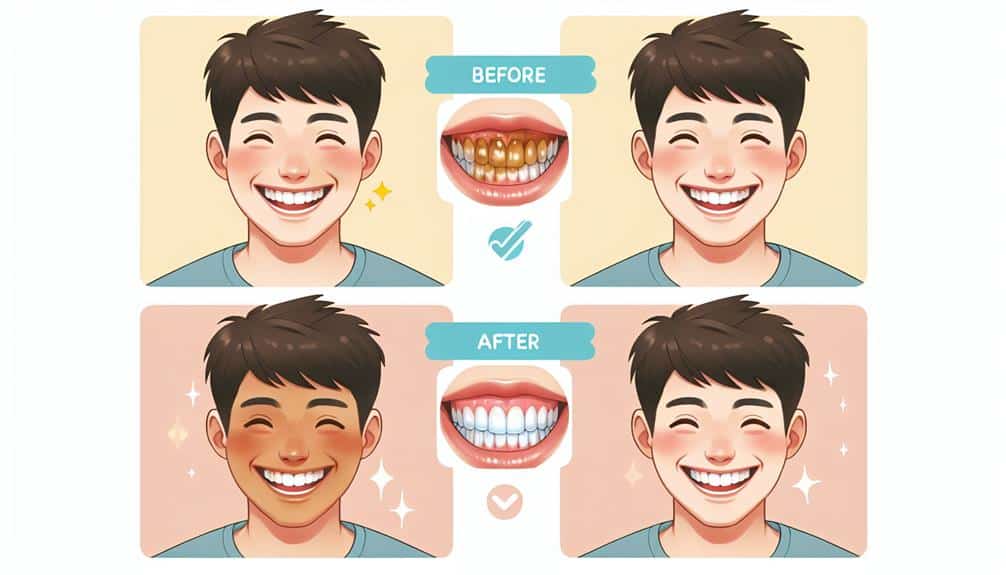Coffee stains make your teeth yellow since the pigments in coffee attach to your enamel and seep into its porous structure. This leads to a yellow hue that impacts the look and strength of your teeth. If you'd like to discover more about how coffee stains affect your enamel and effective ways to prevent or treat them, there are various methods and remedies available.
Key Points
- Coffee pigments bind to enamel, causing a yellowish tint.
- Porous enamel allows coffee pigments to penetrate and stain teeth.
- Staining compromises tooth appearance and integrity over time.
- Coffee's acidic nature weakens enamel, making teeth more prone to discoloration.
- Prevent enamel erosion and yellowing by minimizing coffee-enamel contact.
Causes of Coffee Stains on Teeth
Coffee stains on teeth result from the pigments in coffee binding to the enamel surface, causing discoloration. The porous nature of enamel allows these pigments to penetrate and become embedded, leading to the yellowish tint often associated with coffee drinkers. Prevention methods for coffee stains on teeth primarily revolve around minimizing the contact between coffee and the enamel. Rinsing your mouth with water after consuming coffee can help wash away some of the pigments before they've a chance to adhere to the enamel. Additionally, using a straw to drink coffee can bypass direct contact with the teeth, reducing the staining effect.
Dietary factors also play a role in the extent of coffee staining. Foods high in tannins, such as red wine and certain fruits, can exacerbate the staining process. Conversely, consuming crunchy fruits and vegetables like apples and carrots can help naturally scrub away surface stains. Maintaining good oral hygiene practices, including regular brushing and dental cleanings, can further aid in preventing coffee stains from becoming more pronounced on your teeth.
Effects of Coffee Stains on Enamel
The staining of enamel caused by coffee can compromise the integrity and appearance of your teeth over time. Enamel, the outer layer of your teeth, is a strong protective barrier against decay and damage. However, the pigments present in coffee can lead to the formation of stains on the enamel surface. These stains not only affect the aesthetic appeal of your smile but also indicate potential enamel erosion.
Repeated exposure to coffee can gradually wear down the enamel protection, making your teeth more vulnerable to sensitivity and cavities. The acidic nature of coffee further contributes to the weakening of enamel, exacerbating the staining process. As the enamel becomes compromised, it may become more prone to developing cracks and chips, leading to structural issues within the teeth.
To mitigate the effects of coffee stains on enamel, it's essential to maintain good oral hygiene practices and consider protective measures such as using enamel-strengthening toothpaste. Regular dental check-ups can also help in monitoring enamel health and addressing any concerns promptly.
Home Remedies for Coffee Stain Removal
To address coffee stains on your teeth, explore effective home remedies that can help restore the natural whiteness of your enamel.
When looking for natural remedies to combat coffee stains, consider DIY solutions that are gentle on your teeth yet effective in removing discoloration. One popular method is oil pulling, where swishing coconut or sesame oil in your mouth for 15-20 minutes daily can help lift surface stains.
Baking soda mixed with water to form a paste can also act as a mild abrasive to scrub away coffee residue without damaging your enamel. Additionally, rubbing the inside of a banana peel on your teeth, due to its potassium and magnesium content, may help reduce stains over time.
Another option is using hydrogen peroxide diluted with water as a mouthwash, as it has whitening properties. These natural remedies offer a budget-friendly and chemical-free approach to tackling coffee stains at home.
Professional Whitening Treatments for Stains
Consider professional whitening treatments as a reliable solution for addressing stubborn stains on your teeth. Laser whitening is a popular and effective method used by dental professionals to whiten teeth. During this treatment, a hydrogen peroxide solution is applied to your teeth, and a laser is used to activate the whitening agent, breaking down stains and leaving your teeth several shades lighter.
Another common professional whitening option is bleaching trays. Your dentist will create custom trays that fit your teeth precisely. These trays are filled with a bleaching agent and worn over your teeth for a specified amount of time. The bleaching solution penetrates the enamel, lifting away deep-seated stains and discoloration.
Professional whitening treatments offer quicker and more noticeable results compared to over-the-counter products. Additionally, dentists can tailor the treatment to your specific needs, ensuring a safe and effective whitening process. Before undergoing any whitening treatment, consult with your dentist to determine the best option for achieving a brighter, stain-free smile.
Tips to Prevent Coffee Stains on Teeth
To reduce the likelihood of coffee stains on your teeth, implement consistent oral hygiene practices and consider moderate consumption of staining beverages. Proper oral hygiene, including brushing your teeth at least twice a day and flossing daily, can help prevent coffee stains by removing plaque and surface stains. Additionally, using a whitening toothpaste that contains abrasives or polishing agents can help to minimize the accumulation of stains on the teeth.
When consuming coffee, consider using a straw to limit direct contact between the beverage and your teeth. Drinking water alongside coffee can also help wash away the staining compounds and reduce their impact on your teeth. Rinsing your mouth with water after drinking coffee can further prevent the buildup of stains.
For individuals concerned about coffee stains, cosmetic dentistry offers various options for stain prevention. Professional dental cleanings can remove stubborn stains, while treatments like dental bonding or veneers can provide a long-lasting solution for discolored teeth. Regular visits to your dentist can also help monitor and address any staining concerns effectively.
Frequently Asked Questions
Can Coffee Stains on Teeth Cause Any Long-Term Damage to Oral Health?
To prevent long-term damage from coffee stains on teeth, practice good dental hygiene. Regular brushing, flossing, and dental cleanings are essential. Cosmetic dentistry offers whitening treatments that can help restore teeth to their natural color and improve oral health.
Are Certain Types of Coffee More Likely to Cause Stains on Teeth Than Others?
Certain types of coffee, like dark roasts, are more prone to staining teeth due to their higher acidity and tannins. Varying brewing methods can also impact the level of staining potential. Remember, it's not just the coffee itself but how it's brewed that matters.
How Do Coffee Stains on Teeth Compare to Stains Caused by Other Beverages, Like Tea or Red Wine?
When comparing staining mechanisms, coffee, tea, and red wine can all discolor teeth due to chromogens binding to enamel. Coffee's acidity and dark pigments contribute to its notable staining effects, potentially impacting enamel health.
Can Genetics Play a Role in How Susceptible Someone Is to Developing Coffee Stains on Their Teeth?
Genetic factors can indeed influence susceptibility to coffee stains on teeth. However, proper dental care and prevention strategies, like regular cleanings and limiting coffee intake, can help combat these stains regardless of your genetic predisposition.
Are There Any Specific Dental Conditions That Can Make Someone More Prone to Developing Coffee Stains on Their Teeth?
Maintaining good dental hygiene and moderating caffeine intake can help prevent coffee stains on teeth. Enamel erosion and low saliva production may increase susceptibility. Regular dental check-ups and professional cleanings can assist in managing these risks effectively.



